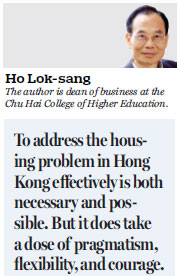Pricey housing a big problem for a minority
Updated: 2017-05-09 07:16
By Ho Lok-sang(HK Edition)
|
|||||||||
Ho Lok-sang points out that most citizens are accommodated so 'pain' is borne mainly by a small proportion of households
Some time ago a team of researchers at Shue Yan University published an eye-catching report on the "Pain Index". According to its survey, 83 percent of Hong Kong people find life in the city painful, and the most painful problem in Hong Kong is housing. This finding is perplexing, even though most people may not find it surprising. This is because some 30 percent of Hong Kong's households now enjoy heavily subsidized public housing, 15 percent of the city's households live in subsidized for-sale flats and over 35 percent of Hong Kong's households own their own flats, leaving only 20 percent of households living in private rental housing. Among homeowner households, over 60 percent have already paid off their mortgage loans. Among those who live in private flats and who do not own their homes, 3.5 percent enjoy flats provided by employers or pay no rent. If housing is a problem, it should apply mainly to the 16.5 percent who may indeed be struggling with high rent or wondering how they could buy a flat.
But if for most Hong Kong households housing is not a problem, how can housing be the most painful problem in this survey?
The fact is housing prices are indeed high, rents are indeed rising faster than inflation and many live in tiny, stuffy, and sometimes dangerous subdivided homes. The percentage of households living in such "painful" conditions is small but the number is big and the number of households waiting in the queue for public housing breached 300,000 not too long ago, while the average wait long ago exceeded the target of three years.

Thus housing is not really a problem for most Hong Kong people and the reported results are rather misleading. This may be because the respondents perceive it is a problem, even though they may not personally find it a problem. Thus, in order to more accurately gauge how bad the problem is in Hong Kong, perhaps the survey should ask explicitly if the respondent finds life in Hong Kong painful and if housing is a painful problem for him or her.
This having been said, to address the housing problem in Hong Kong effectively is both necessary and possible. But it does take a dose of pragmatism, flexibility, and courage.
Firstly, let's deal with the "subdivided units problem". The problem is threefold. First is that some of them may not be safe. Second is that rents are rising steeply and making life very difficult for the tenants. Third is that some of them may not be legal.
To me the legality issue is really the last one that needs to be addressed at this juncture. If the subdivided flats are safe (this is of course relative), even if the subdivided flats are illegal I would propose forbearance. A conditional existence with an extra land-rent charge is superior to evicting the tenants and driving them into the streets. Disallowing owners from renting them out would aggravate the shortage and drive rents even higher, which not only makes life more "painful" but creates extra incentives for illegal subdivisions.
We need to understand that safety is always relative. Legal accommodations are not all safer than illegal ones. But really dangerous ones should of course be banned. Instead of banning subdivided flats, the government should try to create more subdivided flats that are relatively safe.
The Bauhinia Foundation Research Centre came up with a good idea to increase the supply of rental flats, which is to let Home Ownership Scheme (HOS) housing owners rent out their flats even if they have not repaid the land premium owed. The researchers proposed that the rental income be shared with the Housing Authority on a pro-rata basis given the share of the unpaid premium in the market value of the flat. This is reasonable and should not be dismissed as having too little impact. Since these flats may also be subdivided properly to accommodate more households, the alleviation of the upward pressures on subdivided unit rents may be significant.
Then there are industrial buildings, many of which now house illegal subdivided units. A proper inspection of these units is necessary to ensure that they are relatively safe. If the safety provisions fall short of the requirement, remedial safety provisions may be recommended. Ignoring the consequences and simply evicting the residents may cause greater danger.
Finally, regarding homeownership, I have already proposed in this column earlier on that the HOS housing scheme should be modified so new HOS housing will be sold at, on average, 10 times Hong Kong's household income, and buyers can resell them only to households who have never bought an HOS flat and who promise not to own another property. These restrictions will reduce the demand for HOS housing, which will then be available to accommodate young couples who want to own a starter home. These units should offer all basic amenities but are small, so owners will have an incentive to move onto better ones when they can afford it.
(HK Edition 05/09/2017 page8)